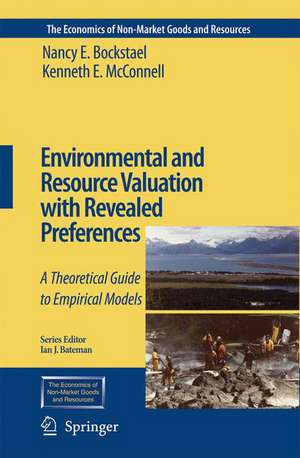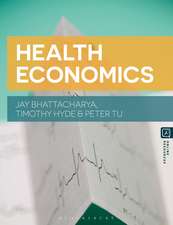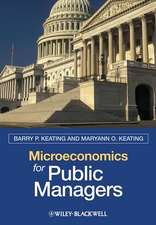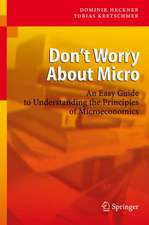Environmental and Resource Valuation with Revealed Preferences: A Theoretical Guide to Empirical Models: The Economics of Non-Market Goods and Resources, cartea 7
Autor Nancy E. Bockstael, Kenneth E. McConnellen Limba Engleză Hardback – 28 noi 2006
The chief purpose of Environmental and Resource Valuation with Revealed Preferences is to collect in one place current thought on the various revealed preference approaches to environmental valuation and to subject these approaches to consistent theoretical critique.
| Toate formatele și edițiile | Preț | Express |
|---|---|---|
| Paperback (1) | 949.10 lei 6-8 săpt. | |
| SPRINGER NETHERLANDS – 28 oct 2010 | 949.10 lei 6-8 săpt. | |
| Hardback (1) | 955.08 lei 6-8 săpt. | |
| SPRINGER NETHERLANDS – 28 noi 2006 | 955.08 lei 6-8 săpt. |
Preț: 955.08 lei
Preț vechi: 1164.73 lei
-18% Nou
Puncte Express: 1433
Preț estimativ în valută:
182.75€ • 190.81$ • 151.25£
182.75€ • 190.81$ • 151.25£
Carte tipărită la comandă
Livrare economică 04-18 aprilie
Preluare comenzi: 021 569.72.76
Specificații
ISBN-13: 9780792365013
ISBN-10: 0792365011
Pagini: 376
Ilustrații: XVI, 376 p.
Dimensiuni: 155 x 235 x 22 mm
Greutate: 0.72 kg
Ediția:2007
Editura: SPRINGER NETHERLANDS
Colecția Springer
Seria The Economics of Non-Market Goods and Resources
Locul publicării:Dordrecht, Netherlands
ISBN-10: 0792365011
Pagini: 376
Ilustrații: XVI, 376 p.
Dimensiuni: 155 x 235 x 22 mm
Greutate: 0.72 kg
Ediția:2007
Editura: SPRINGER NETHERLANDS
Colecția Springer
Seria The Economics of Non-Market Goods and Resources
Locul publicării:Dordrecht, Netherlands
Public țintă
ResearchCuprins
Setting the Stage.- Welfare Economics for Price Changes.- The Concept of Weak Complementarity.- Implementing Weak Complementarity.- Measuring Welfare in Discrete Choice Models.- Hedonic Models of Heterogeneous Goods.- Hedonic Wage Analysis.- Public Goods in Household Production.- The Environment as an Input into Firms’ Production.- Some Broader Considerations.
Recenzii
From the reviews:
"In this book, Bockstael and McConnell concisely synthesis the economic principles that must be followed for revealed preference methods to yield valid welfare measures. … This book provides that grounding in a clear and concise way. In addition, this book will be a major time saver to applied environmental economists attempting to do theoretically sound empirical work." (John Loomis, Environmental and Resource Economics, Vol. 42, 2009)
"In this book, Bockstael and McConnell concisely synthesis the economic principles that must be followed for revealed preference methods to yield valid welfare measures. … This book provides that grounding in a clear and concise way. In addition, this book will be a major time saver to applied environmental economists attempting to do theoretically sound empirical work." (John Loomis, Environmental and Resource Economics, Vol. 42, 2009)
Textul de pe ultima copertă
Environmental and Resource Valuation with Revealed Preferences: A Theoretical Guide to Empirical Models provides a systematic review of those economic approaches for valuing the environment and natural resources that use information on what people do, not what they say. The authors have worked on models of revealed preferences for valuing environmental and natural resources for several decades and authored some of the seminal papers in the field. The book is a natural outcome of their conceptual contributions and their many years of experience in empirical policy research, natural resource damage litigation and teaching on the topic.
The chief purpose of Environmental and Resource Valuation with Revealed Preferences is to collect in one place current thought on the various revealed preference approaches to environmental valuation and to subject these approaches to consistent theoretical critique.
The unique features of Environmental and Resource Valuation with Revealed Preferences include:
• a development of the theory from the simplest ideas of economic preferences, based on microeconomics and welfare theory, extended to show how these ideas can be used empirically;
• coherent theoretical and practical treatment of the approaches developed to value the environment and public goods, from travel cost to wage and housing hedonics to averting behavior and cost of illness;
• a candid review of the major conceptual challenges and an exploration of neglected issues in the literature;
• connections between theory and empirical research for real world problems.
Environmental Valuation with Revealed Preferences is an exceptionally useful tool for economists and graduate students working in the area of environmental and resource economics at universities, research institutes, government agencies, non-governmental environmental organizations,multi-lateral banks.
The chief purpose of Environmental and Resource Valuation with Revealed Preferences is to collect in one place current thought on the various revealed preference approaches to environmental valuation and to subject these approaches to consistent theoretical critique.
The unique features of Environmental and Resource Valuation with Revealed Preferences include:
• a development of the theory from the simplest ideas of economic preferences, based on microeconomics and welfare theory, extended to show how these ideas can be used empirically;
• coherent theoretical and practical treatment of the approaches developed to value the environment and public goods, from travel cost to wage and housing hedonics to averting behavior and cost of illness;
• a candid review of the major conceptual challenges and an exploration of neglected issues in the literature;
• connections between theory and empirical research for real world problems.
Environmental Valuation with Revealed Preferences is an exceptionally useful tool for economists and graduate students working in the area of environmental and resource economics at universities, research institutes, government agencies, non-governmental environmental organizations,multi-lateral banks.
Caracteristici
A development of the theory from the simplest ideas of economic preferences, based on microeconomics and welfare theory, extended to show how these ideas can be used empirically Coherent theoretical and practical treatment of the approaches developed to value the environment and public goods, from travel cost to wage and housing hedonics to averting behavior and cost of illness A candid review of the major conceptual challenges and an exploration of neglected issues in the literature Connections between theory and empirical research for real world problems
























